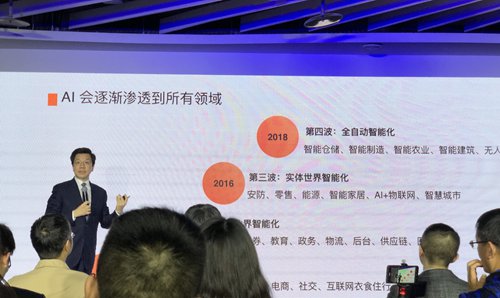
Kai-fu Lee, CEO and chairman of Sinovation Ventures, gives a speech during the DeeCamp 2019 summer camp launch event on Monday in Beijing. (Photo: GT)
DeeCamp, a summer camp hosted by Sinovation Ventures to turn artificial intelligence (AI) ideas into reality, announced plans on Monday to double its student intake to 600 compared with last year's class.
Through the five-week program, students from both home and foreign elite universities will head to the camp and showcase their AI projects in such sectors as retail, finance and medical treatment.
Launched in 2017, the free program was initially open to more than 30 students. It is seen as an example of the country's push by industry heavyweights to address talent shortages.
Kai-fu Lee, CEO and chairman of Sinovation Ventures, said at the DeeCamp 2019 summer camp launch event that China faces such issues as AI talent shortages and structural imbalances.
With China's demand for AI talent growing at a compound rate of more than 200 percent, the country is beefing up efforts in AI basic research and AI talent training via the connection between schools and enterprises, said Lee.
"AI has entered the era of commercial application, and the mode of AI plus, similar to internet plus, will be widely applied and experience rapid growth in the next few years," he added.
Zhang Tong, former head of Tencent's AI lab, said at the event that it is the trend to combine industry, academia and research in terms of AI students' development.
The DeeCamp training program is part of a broader plan initiated in 2018 by the Ministry of Education, Sinovation Ventures and Peking University to nurture more than 5,000 students and 500 teachers in the AI field from top universities within five years.
According to a report by Goldman Sachs, China accounted for 51 percent of global newly emerging AI projects in 2017, surpassing that of the US. However, China only has 5 percent of the global AI talent pool.
A total of 35 domestic universities were in the first batch of educational institutions approved by the Ministry of Education at the end of March to set up AI majors at the undergraduate level.
Zhejiang University in East China's Zhejiang Province, a manufacturing and commercial hotspot, began an undergraduate recruitment program for its new AI major, marking the official inclusion of AI into undergraduate education at domestic universities, domestic news outlet thepaper.cn reported on Sunday.
Yu Yong, a professor at Shanghai Jiao Tong University, said at the event that China is trying to explore its path for AI education, and AI should not be merely technology-oriented but connected to more industries and subjects.
"Meanwhile, it is very important to figure out exactly what AI can do. It is not an independent subject but one that's only useful in application scenarios," Yu told the Global Times on the sidelines of the event.


